
Right to Information becoming toothless
text_fieldsThe Citizenship Amendment Bill enacted in December 2019 to provide fast-track citizenship to Hindus, Christians, Buddhists, Parsis, Jains and Sikhs who seek asylum in India. After four years, rules under the Act were issued in March this year, and based on them citizenship was granted to applicants. The procedure, documentation and their registration would naturally be accomplished through procedures using modern technology systems with due records. As such, information related to this should be readily available. But that is in theory. In actual fact, it is not to be, as things turned out recently. In the reply given to ‘the Hindu’ newspaper when they raised questions according to the Right of Information Act, as to how many have applied for citizenship to the Ministry of Home Affairs through the Public Information Officer, how many have been granted citizenship and how many are under consideration, it was stated that they did not have compiled data as requested nor were they required to provide such data as they did not create data or store compiled data. A reply to a similar request from an applicant in Maharashtra in April had said that there is no department to maintain records of citizenship applications. There are no systems of keeping records or regulations under the Citizenship Act, 1955 or the Citizenship Amendment Act, 2019; Therefore, the RTI Officer has no obligation to prepare and provide the information.
This refusal to provide data, in this era of computerized collection and online availability of information is the latest demonstration of how determined the establishment is to stifle the civil right to information and slam the door on transparency. The Right to Information Act, 2005 was a notable piece of legislation during the first UPA regime under the leadership of Manmohan Singh. This law, which was instrumental in bringing considerable critical information into the public sphere and correct the governments, has been getting weaker and weaker ever since Narendra Modi took over in 2014, although non-BJP governments are not far better in this regard either. To the delight of the ruling class, democracy and civil liberties are undermined by the totalitarian ruling class approach of ‘don't ask questions, only we need to have the information, and citizens should just obey’. Thus, those in power use these techniques to make the said law toothless.
The process of making the RTI Act toothless starts with the Central and state governments showing reluctance to appoint members to Information Commissions which are supposed to gather information and provide it to seekers. This results in an overload of applications thereby becoming unable to provide responses in time. According to a study by Satark Nagrik Sangathan, a civic group that stands for transparency in governance, seven of the country's 29 information commissions were completely inactive for varying lengths of time in the years 2023-2024. In Jharkhand the commission was inactive for four years, in Tripura it was inactive for three years and in Telangana for one and a half years. In many states, there are no heads. In Maharashtra, one lakh applications, including appeals, are awaiting action. Leaving aside states, the attitude of the central government is appalling. After 2015, the Centre has never appointed commissioners except when citizens approached the courts. Instead of 11 members, there are now only three. A total of four lakh applications are pending across the country. Because of this, it takes more than a year to get information from 14 commissions. According to an estimate, a fresh appeal in Chhattisgarh and Bihar would have to wait till 2029 for disposal.
More problems lie in the appointments of commission members. Given that the majority of those appointed are retired officers or those with political ties, they are more likely to take sides with the ruling party. As a result, the officials' lax attitude also gets worse. Amendments to the RTI in the last five years have further weakened them. Lowering the service pay of the members and relegating the power to fix their grade and pay to the central government has significantly curtailed the freedom and authority of the members. Apart from this, the Digital Personal Data Protection (DPDP) Act, 2023 has also affected the operation of RTI. Earlier in RTI Act, personal data, or for that matter any data could be withheld only when certain specific conditions were met for non-disclosure. However, in the amendment contained in the DPDP, information that is deemed to be personal is not provided. Moreover, the crucial provision that the citizen's right to information is similar to that of MPs and MLAs to receive information from the government, has now been taken away. By and large, most states - no matter their political differences - and the central government which determines the law itself, have worn away the edge of a powerful weapon for civil liberties. Underlying them is a constant effort everywhere to protect the executive from transparent systems. Civil rights can be revived and sustained only if a vigilant citizenry stays awake.

























